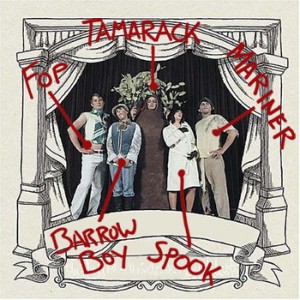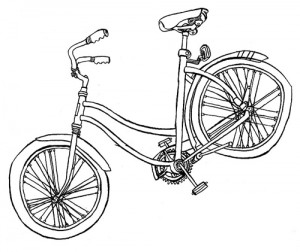The Annotated Decemberists No. 6: “The Apology Song”
 Perhaps no band’s lyrics better lend themselves to pseudo-academic analysis than those of The Decemberists. The Annotated Decemberists is an attempt to puzzle through the Portland, Oregon, group’s entire catalog song by song—examining all the obscure vocabulary, historical references and poetic subtext—or go crazy trying.
Perhaps no band’s lyrics better lend themselves to pseudo-academic analysis than those of The Decemberists. The Annotated Decemberists is an attempt to puzzle through the Portland, Oregon, group’s entire catalog song by song—examining all the obscure vocabulary, historical references and poetic subtext—or go crazy trying.
We’ve arrived at the sixth and final entry from The Decemberists’ debut EP, Five Songs. Yes, you read that right. There are six songs on Five Songs. When the band initially self-released the recording in 2001, it had but five tracks. Then Hush Records re-released it in 2003 with “The Apology Song” as a contradictory addition.
“Apology” is as straightforward as a Decemberists song gets. Colin Meloy has said repeatedly when performing it in concert—including a solo acoustic performance archived at NPR’s All Songs Considered—that it is a completely true story.
“This song was actually written with a specific utility in mind. It was sung over the phone to somebody in England, apologizing for having their bicycle stolen.”
In a deliciously ironic epilogue to the tale, Meloy has also said that he eventually found the stolen bicycle and returned it to its owner, only to accidentally crush it later on while trying to help his friend move. The moral of the story: Don’t let Colin Meloy anywhere near your bicycle.
“Apology Song”
from 5 Songs (2003)
I’m really sorry, Steven[1]
But your bicycle’s been stolen
I was watching it for you
‘Til you came back in the fall
Guess I didn’t do a good job after all

I was feeling really sorry, Steven
And I spent all morning grieving
And everybody’s saying
That you’ll take the news gracefully
Somehow I don’t think I’ll be getting off so easily
I meant her[2] no harm
When I left her unlocked
Outside the Orange Street Food Farm[3]
I was just running in
Didn’t think I’d be that long
I came out, she was gone
And all that was there was some bored old dog
Leashed up to the place where your bicycle had been[4]
Guess we’ll never see poor Madeleine again
Let this be consolation, Steven
That all the while you were in England
I treated her with care and respect
And gave[5] her lots of love
And I was usually pretty good ’bout locking her up

Where has she gone?
Well, I bet she’s on the bottom of a Frenchtown pond[6]
Rudely abused on some hescher’s[7] joyride
So I wrote you this song
In the hope that you’d forgive me
Even though it was wrong
Being so careless with a thing so great
And taking your poor Madeleine away, away
- The actual name of the friend who asked Meloy to watch his bicycle↑
- Referring to a cherished vehicle is one of the only occasions in the English language when it is acceptable to use a gendered pronoun for an inanimate object, an extension of the tradition of sailors attributing a benevolent female spirit to their ship. Indeed, as we learn in a few lines, the bicycle even had a female name: Madeleine.↑
- A supermarket in Missoula, Montana, where Meloy lived before moving to Portland and forming The Decemberists, meaning this song predates the band.↑
- Did the thief abandon his dog in favor of the bicycle? No. Probably not. Still, if I were Meloy, I would have taken the dog in for questioning.↑
- The official lyrics at decemberists.com have this as “have,” but I’m about 99 percent sure that’s a typo.↑
- Frenchtown Pond State Park is a “five-acre, spring-fed lake (with) a maximum depth of about ten feet (and) a variety of fish-sunfish, bass and bullhead” about 15 miles west of Missoula.↑
- It’s not clear if this is what Meloy means, but “hesher” is slang for a mullet-sporting, pot-smoking heavy metal enthusiast. Chuck Klosterman used the term in a 2002 essay on the death of Ratt guitarist Robbin Crosby, and Joseph Gordon-Levitt played an archetypal hesher in the 2010 film “Hesher.” The word’s origins are unclear, but Cassell’s Dictionary of Slang says it dates back to the ’80s and could be a combination of “heavy metal” and “thrash.” Other theories abound. Rooting around online, I found folks who insisted it was derived from skateboarding culture (where skaters are either “hesh” or “fresh”) and a persistent theory that it is a reference to Hessians, German mercenaries who fought for the British during the Revolutionary War.↑